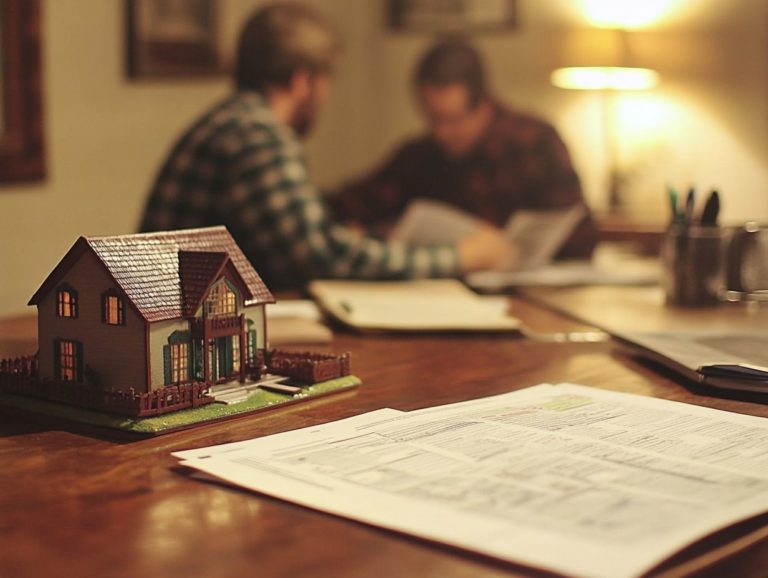The Role of Home Insurance in Home Buying
Home insurance plays a pivotal role in your home buying journey, offering both peace of mind and financial protection for one of your most significant investments.
Grasping the different types of coverage and the factors that affect your insurance rates empowers you to make informed decisions. From basic to comprehensive options, understanding what aligns with your needs is essential.
This guide helps you navigate home insurance. You’ll feel confident and secure in your homeownership journey!
Contents
Key Takeaways:

Home insurance is a crucial aspect of the home buying process! It provides financial protection for homeowners in case of unexpected events. Before diving into the options, it’s important to understand what to know before buying home insurance. There are different types of home insurance coverage available, with basic coverage providing minimal protection while comprehensive coverage offers more extensive options. Various factors, including location, home value, and personal circumstances, can affect home insurance rates. It’s essential to consider these when choosing the right insurance for your home.
Understanding Home Insurance
Understanding home insurance is crucial for both homeowners and home buyers. It offers essential protection against the financial risks tied to property damage, theft, and liability claims, which means if someone gets hurt on your property. For a deeper insight, consider understanding the importance of home insurance.
This type of insurance acts as a safety net for your personal property and provides a variety of coverage options, including liability protection that shields you from damage claims.
Mortgage lenders require proof of insurance before you can secure a mortgage, ensuring that the interests of both the lender and the homeowner are safeguarded in case of loss.
It’s important to understand insurance policies and coverage limits to make the right choices.
What is Home Insurance?
Home insurance, often referred to as homeowners insurance, serves as a vital safety net, offering you financial protection against many risks that come with owning a home, including property damage and liability claims.
This comprehensive coverage includes several essential components, such as property damage coverage, which protects the physical structure of your home from incidents like fire, vandalism, or natural disasters.
Liability coverage is equally important, protecting you against legal claims made by individuals who might be injured on your property, potentially saving you from significant legal fees and settlements.
Many policies also cover personal belongings, from your cherished furniture to valuable electronics, providing a crucial safety net in the event of theft or damage.
You have the flexibility to tailor coverage limits to meet your specific needs, ensuring that you re adequately protected without paying for unnecessary extras. By customizing a policy, you can strike the perfect balance that fits your circumstances, granting you peace of mind and financial security.
Importance of Home Insurance in Home Buying
Home insurance is essential in the home buying process, as mortgage lenders typically require you to secure a homeowners insurance policy as proof of coverage before finalizing your loan. This requirement is designed to protect both you and the lender; while you safeguard your investment against unforeseen events, the lender ensures that their collateral remains secure. Understanding the role of home insurance providers is crucial in this process.
Having a policy in place provides you with peace of mind, knowing you are covered in the event of damage or loss. Understanding the role of underwriting in home insurance can also be beneficial. Insurance agents can be invaluable allies during this phase, guiding you in selecting the right coverage options and clarifying how these choices impact your closing costs.
By helping you navigate your options, these professionals can simplify what might otherwise be a daunting aspect of the home-buying journey.
Types of Home Insurance Coverage
Grasping the different types of home insurance coverage is crucial for you as a homeowner. This knowledge gives you the power to select the right insurance policy that suits your specific needs and ensures your property is adequately protected.
Basic Coverage vs. Comprehensive Coverage

Are you confused about whether to choose basic or comprehensive coverage for your home? Let s break it down. When you re diving into home insurance, it s crucial to grasp the distinctions between basic coverage and comprehensive coverage. This understanding ensures you select a policy that truly meets your protection needs.
Basic coverage typically safeguards you against common perils like fire, theft, and specific types of water damage. However, it may leave you exposed to a broader range of risks. In contrast, comprehensive coverage goes the extra mile, offering a more robust safety net against various threats, including natural disasters and vandalism.
It s essential for homeowners to remember that both options come with their own set of exclusions, such as certain natural calamities or mold damage. The coverage limits within each policy can significantly affect your financial risk in the event of a disaster, making it imperative to assess your unique circumstances and potential vulnerabilities as you make your decision.
Additional Coverage Options
As a homeowner, you often have the opportunity to enhance your insurance policy with additional coverage options, ensuring that both your property and personal belongings are well protected against specific risks. This becomes especially important when you consider unforeseen events like floods or earthquakes, which may be excluded from standard policies.
Many homeowners may not realize that options like flood or earthquake insurance can offer not just peace of mind but also financial security. Furthermore, insurance riders are essential for tailoring your policy to meet your unique needs. By choosing riders, you can specifically safeguard valuable items such as jewelry, art pieces, or collectibles, effectively customizing your insurance to address your distinct coverage requirements.
Factors Affecting Home Insurance Rates
Numerous factors shape home insurance rates, making it crucial for you as a homeowner to grasp how your unique situation influences insurance premiums and the overall costs of coverage. Understanding these elements empowers you to make savvy decisions and potentially save money.
Location, Home Value, and Personal Factors
The location of your home plays a significant role in shaping your insurance premiums. If you live in an area prone to natural disasters or high crime rates, you can expect higher rates.
The geographical landscape introduces unique risk factors that insurance companies carefully assess when calculating your premiums. For example, if your home is near the coast, you might face increased risks from hurricanes or flooding. Conversely, if you reside in a wildfire-prone area, expect a thorough evaluation of your property s vulnerability to fire damage.
The value of your home also plays a crucial role in determining coverage costs. Any renovations you’ve undertaken to enhance its charm or safety can lead to variations in your coverage calculations. Personal factors, such as your family size and structure, can also impact insurance costs, as insurers often consider household composition and associated responsibilities to tailor their policies to fit your needs.
How to Choose the Right Home Insurance
Selecting the ideal home insurance demands thoughtful consideration of multiple factors. You must assess your specific coverage needs, explore the array of insurance options available, and seek insights from experienced insurance agents to make well-informed decisions. This careful approach guarantees you get the protection that fits your needs perfectly.
Factors to Consider

When selecting home insurance, it’s essential to consider various factors, such as your personal coverage needs, the insurance options available to you, and the undeniable value of obtaining multiple quotes. One crucial element that often slips under the radar is the home inspection, which can profoundly impact your coverage and premiums. Additionally, understanding the role of agents in home insurance can help you navigate these complexities. By identifying potential risks or pre-existing issues, a thorough inspection ensures you are well-protected against specific hazards that could affect your property.
Insurance agents are invaluable in this process. They provide customized insurance quotes that cater to your individual requirements and preferences. They can guide you through the maze of policy options, helping you grasp the nuances that could influence both your protection and costs, ensuring that the coverage you choose truly aligns with your unique needs.
The Home Buying Process and Home Insurance
The home buying process is intricately linked with home insurance. Understanding what home insurance does for mortgages is vital for you as a home buyer. This understanding helps you secure financing and ensures that your personal property is effectively protected.
When to Get Home Insurance
Securing home insurance should ideally be on your to-do list before closing on a property, as many mortgage lenders require proof of insurance to wrap up the home buying process. Understanding the types of home insurance for first-time buyers is a crucial step that fulfills lender requirements and safeguards your investment against unforeseen risks.
As a potential homeowner, start exploring insurance options early to find the best fit for you! Once you ve pinpointed a suitable policy, it s wise to finalize it a few weeks before the closing date, ensuring there s no gap in coverage and granting you peace of mind as you transition from being a property seeker to a proud homeowner.
Involvement of Lenders and Insurers
Your relationship with lenders and insurers is vital in the home buying journey. They require specific documentation, including proof of home insurance for first-time buyers, to protect their investments and ensure you are adequately covered. This collaborative dynamic sets the stage for a seamless transaction.
Lenders often partner closely with insurance agents to verify that the insurance policies meet essential coverage requirements, thereby minimizing risks related to potential property damage or loss. By securing the appropriate insurance contracts, lenders bolster their confidence in the investment, while you gain peace of mind knowing you ll be compensated in the event of unforeseen incidents. This mutual assurance not only streamlines the transaction process but also protects the interests of both parties, underscoring the importance of teamwork in this pivotal stage of home ownership.
Frequently Asked Questions
What is the role of home insurance in home buying?

Home insurance plays a crucial role in the home buying process by providing financial protection against potential damages or losses to your new home. Understanding the role of home insurance in real estate is typically required by lenders before they approve a mortgage loan.
What does home insurance cover?
Home insurance typically covers damages to the physical structure of your home, as well as personal belongings within the home. It may also provide liability coverage in case someone is injured on your property.
Do I need home insurance if I am buying a home in a flood-prone area?
Yes, don t wait secure home insurance if you re buying in a flood-prone area! Most standard home insurance policies do not cover flood damage, so you may need to purchase additional flood insurance to fully protect your home.
Is home insurance mandatory when buying a home?
It depends on your lender’s requirements. If you are taking out a mortgage loan, most lenders will require you to have home insurance before they approve your loan. However, if you are buying a home outright with cash, it is not mandatory but highly recommended to have home insurance for protection.
Can I choose my own home insurance provider?
Yes, you can choose your own home insurance provider. Just keep in mind that your lender may have specific coverage and policy limits.
How much does home insurance cost?
Home insurance costs vary based on factors like location, size, and age of your home. On average, homeowners pay about $1,200 each year, but your costs may differ based on your unique situation.





